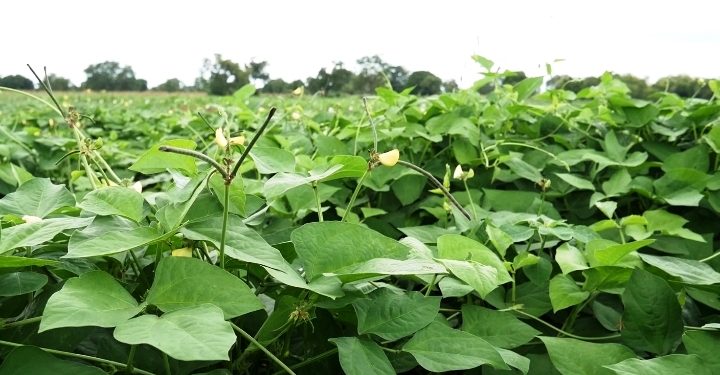 Cowpea farmers in Northern Ghana are calling on scientists at the Council for Scientific and Industrial Research – Savannah Agricultural Research Institute (CSIR-SARI) to develop more advanced, chemical-free solutions for insect pest control. This comes despite the recent release of a genetically modified (GM) Cowpea variety known as Songotra T, which has already helped reduce the frequency of pesticide spraying on farmers’ fields.
Cowpea farmers in Northern Ghana are calling on scientists at the Council for Scientific and Industrial Research – Savannah Agricultural Research Institute (CSIR-SARI) to develop more advanced, chemical-free solutions for insect pest control. This comes despite the recent release of a genetically modified (GM) Cowpea variety known as Songotra T, which has already helped reduce the frequency of pesticide spraying on farmers’ fields.
Since the commercial release of the GM PBR Cowpea variety, also called Songotra T, many farmers in the region have reported significant benefits. Most notably, the variety has helped control the notorious Maruca vitrata pest, a pod borer that has caused extensive damage to Cowpea crops for decades.
Farmers say they have been able to reduce chemical spraying from as many as eight times per season to just two. This has helped to cut costs, reduce their exposure to harmful pesticides, and improve the overall quality of their crops.
However, the battle is not yet over.
Persistent Pest Problems
Farmers have raised concerns about the continued invasion of other leaf-eating insects that affect both crop development and the availability of Cowpea leaves for animal feed.
 “Even though the new Cowpea variety has helped us reduce spraying, we still have to apply chemicals because other insects eat the leaves,” said Adam Fuseini, a Cowpea farmer in Nyankpala. “We’ve told the scientists our dream is to farm without spraying at all.”
“Even though the new Cowpea variety has helped us reduce spraying, we still have to apply chemicals because other insects eat the leaves,” said Adam Fuseini, a Cowpea farmer in Nyankpala. “We’ve told the scientists our dream is to farm without spraying at all.”
Another farmer, Musah Yakubu, shared similar sentiments. “We feel better now with less spraying, but we need more support. The cost of purchasing chemicals is high now, and we want to grow food that is safe for both us and our animals,” he said.
Scientists Acknowledge Farmers’ Concerns
Responding to the farmers’ requests, Dr. Gloria Adazebra, a Cowpea Breeder at CSIR-SARI, said that the institute is taking their feedback seriously. She explained that while it is theoretically possible to develop Cowpea varieties that require no chemical spraying, such advancements would require significant investment in research and deployment.
 “The concerns raised by the farmers are valid,” Dr. Adazebra said. “We are exploring ways to improve resistance to a wider range of pests, but it’s important to understand that completely eliminating the use of chemicals is complex and expensive. Farmers hold the key to what we do, they feedback is good. I must say we have not stopped our research work in other areas.”
“The concerns raised by the farmers are valid,” Dr. Adazebra said. “We are exploring ways to improve resistance to a wider range of pests, but it’s important to understand that completely eliminating the use of chemicals is complex and expensive. Farmers hold the key to what we do, they feedback is good. I must say we have not stopped our research work in other areas.”
She added that collaboration between researchers, policymakers, and development partners will be essential to achieve that goal.
Protecting Farmers and Ensuring Quality Seeds
Dr. Adazebra also disclosed that eight seed companies have been officially licensed to produce and distribute the GM Cowpea variety. To address farmers’ concerns about quality, she assured that CSIR-SARI will monitor all licensed seed producers to ensure that they meet standards and do not short-change farmers.
“We are working closely with the licensed seed companies to make sure they maintain the genetic integrity and quality of the Cowpea seeds,” she said. “Our goal is to make sure the benefits of this technology reach the farmers as promised.”
Biosafety Authority Urges Use of Certified Seeds
The National Biosafety Authority is also playing a role in ensuring farmer and consumer safety. Kwesi Addison, Principal Biosafety Officer at the Authority, urged farmers to purchase only certified seeds approved by the Authority.
 “The genetically modified Cowpea developed by CSIR has gone through all safety checks and is safe for human consumption,” he assured. “Farmers should avoid uncertified sources to protect themselves and their consumers.”
“The genetically modified Cowpea developed by CSIR has gone through all safety checks and is safe for human consumption,” he assured. “Farmers should avoid uncertified sources to protect themselves and their consumers.”
A Push Toward Sustainable Farming
The call for more sustainable and chemical-free farming practices is growing louder among smallholder farmers in the north. Many say they are ready to adopt newer technologies that will protect both human health and the environment.
While the introduction of Songotra T has been a step forward, farmers believe more innovation is needed—especially technologies that can eliminate pesticide use entirely.
For now, they remain hopeful that scientists will continue to work closely with them to develop solutions that are not only effective but also affordable and accessible.
Source:www.KumasiMail.Com/Noah Nash Hoenyefia
































































